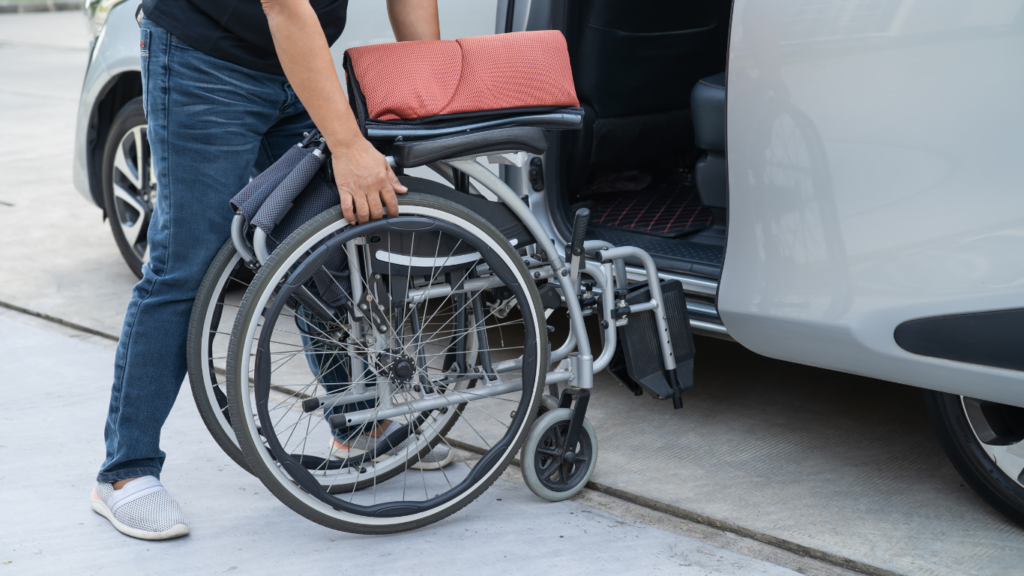CoverMy
20/12/2020
As a taxi driver, being flexible is part of the job. Helping older passengers with their bags or taking your passengers to an unfamiliar destination. But what about wheelchair access? How can you adapt your business to further assist disabled and wheelchair users? Check out our guide below on the regulations for Wheelchair Accessible Taxi Drivers. You’ll also find more information about the duty of care drivers have when driving designated wheelchair accessible vehicles.
Wheelchair Accessible Taxi Regulations
The Equality Act dictates that all taxi drivers who have designated wheelchair accessible vehicles should offer physical assistance to disabled passengers when necessary. If you drive a wheelchair accessible vehicle, the best place to get all the information you need is your local authority. As a starting point, there are a few things to remember when helping disabled passengers, according to the Equality Act.

Your duties as a WAV driver are to:
1. Carry the passenger while they’re in their wheelchair if necessary
2. Not make any additional charges for the time it takes to carry the passenger while in their wheelchair
3. To ensure the safety and comfort of the passenger
4. Provide the passenger with mobility assistance when necessary
According to wheelchair accessible taxi regulations and Human Rights law. Passengers with disabilities should be treated equally to those who do not live with a disability. It’s important to remember that overcharging a disabled passenger could result in prosecution, as this is strictly against the law.
Black Cabs and Wheelchair Access
All hackney carriages are designed to carry disabled passengers. Therefore, no black cab driver is allowed to refuse a fare from a disabled person. Refusing a fare can only be done if the distance which the passenger requests is unreasonable, or if the driver feels threatened by the passenger. Drivers are also required to not start their meter until disabled passengers have been helped into the cab.
Private Hire Taxis and Disabled Passengers
Much like black cabs, private hire vehicles are also not allowed to refuse a fare based on a passenger’s disability. However, private hire vehicles are not all required to be wheelchair accessible. When it comes to PHVs, it is usually required that the passenger asks in advance for a wheelchair accessible taxi. The specified WAV driver will also have the same duties as a black cab driver. These include to help the disabled passenger in and out of the vehicle and to ensure their safety and comfort.
Are You Exempt From Taking Disabled Passengers?
When it comes to assisting disabled passengers, there may be reasons why you may not be able to offer the full mobility assistance required. This has been taken into consideration by local authorities. If, for example, you have an injury that would affect your ability to physically help or carry a disabled passenger, then you have valid exemption not to do so.
When assisting passengers with guide dogs, the same rules apply. You should treat your disabled passengers in the same way as any other passengers. There has been instances whereby due to health conditions or allergies, drivers have been made exempt to carry guide dogs. If you think you may be exempt from carrying passengers with guide dogs or disabled passengers themselves, you should contact your local authority as soon as possible. That way, you can apply for an exemption certificate, stating that you are unable to carry out these duties for disabled passengers.
As a driver of a wheelchair accessible taxi, you may want to refresh your knowledge when it comes to the law and what your duty of care is to your passengers. It will help you to recognise exactly what’s expected of you as a WAV taxi driver, and how you can improve your current service for disabled passengers.
Looking to insure your WAV vehicle at a competitive rate? Contact CoverMy Cab to see how our team of experts could help you find affordable insurance for your wheelchair accessible taxi.

